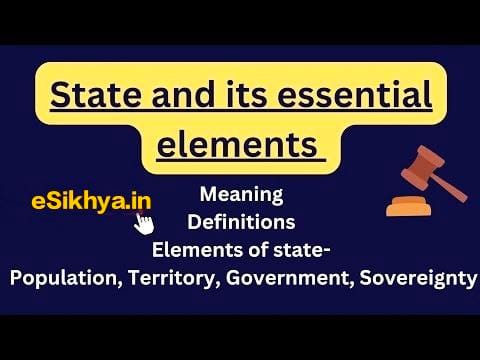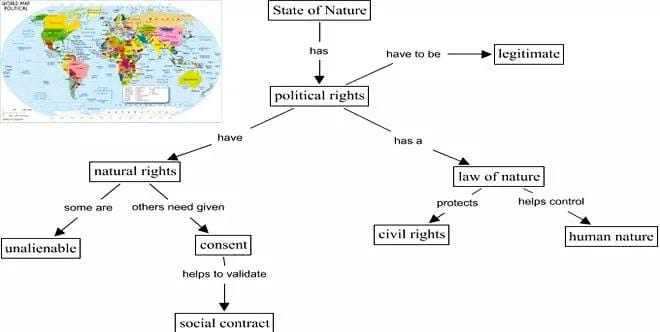Definition of the State
A State is a political and legal entity that possesses sovereignty over a defined geographic territory, characterized by a structured government, a permanent population, and the capacity to enter into relations with other states. The state has the authority to create and enforce laws, manage resources, and ensure security within its borders. It is the primary actor in international relations and plays a key role in organizing and regulating society, often being responsible for governance, law enforcement, defense, and public services.
According to political theorist Max Weber, the state is defined as “a human community that successfully claims the monopoly of the legitimate use of physical force within a given territory.”

Major Elements of the State
To qualify as a state, an entity must possess the following key elements:
- Population
- Definition: The population is the group of people who live within the state’s territory and are subject to its authority. It can consist of citizens and non-citizens, but the state must have a population, as it is the people who give life to the state’s laws, governance, and institutions.
- Significance: Without a population, there would be no one to govern, and the state would lack the necessary social foundation. The size of the population can vary, but every state must have a stable and identifiable group of individuals to function effectively.
- Territory
- Definition: Territory refers to the defined geographic area over which the state exercises its authority and sovereignty. This includes land, airspace, and sometimes maritime areas, depending on the state’s geographical location.
- Significance: The state must have clearly defined and recognized borders. This territorial integrity is essential for the state’s legal jurisdiction, resource management, and defense. Conflicts over territory can lead to disputes or even wars, as territory is fundamental to a state’s identity and security.
- Government
- Definition: The government is the organization or system of institutions through which the state exercises its authority, enforces laws, and makes decisions for the welfare of its people. It can take various forms, such as a democracy, monarchy, dictatorship, or oligarchy.
- Significance: The government is responsible for maintaining law and order, providing public services, ensuring national defense, and managing foreign relations. It acts as the central authority that administers the state and ensures that the state functions as a cohesive unit.
- Sovereignty
- Definition: Sovereignty refers to the supreme power or authority of the state to govern itself without interference from external entities. This includes the ability to make laws, enforce them, and conduct foreign policy. Sovereignty is often divided into two categories:
- Internal Sovereignty: The state’s ability to govern its own people, maintain order, and enforce laws within its territory.
- External Sovereignty: The state’s independence from other states and its ability to engage in international relations, such as treaties, diplomacy, and trade agreements.
- Significance: Sovereignty is the defining characteristic of a state, distinguishing it from other entities like provinces or colonies. Without sovereignty, the state would not be fully autonomous, and its capacity to function as a political entity would be compromised. Sovereignty ensures that the state can operate independently, both domestically and internationally.
- Definition: Sovereignty refers to the supreme power or authority of the state to govern itself without interference from external entities. This includes the ability to make laws, enforce them, and conduct foreign policy. Sovereignty is often divided into two categories:
- Recognition (Optional Element)
- Definition: Recognition refers to the acceptance of a state’s existence and sovereignty by other states. While it is not universally considered an essential element of statehood, recognition by other states, particularly in international law and diplomacy, is crucial for participating in global affairs.
- Significance: Recognition can affect a state’s ability to engage in international trade, form alliances, and be a member of international organizations like the United Nations. However, some entities function as de facto states even without widespread recognition (e.g., Taiwan).

Conclusion
The state is a complex institution with several essential elements, including a population, a defined territory, a government, and sovereignty. These elements work together to enable the state to function as the primary political entity, exercising control over its affairs and engaging with other states on the global stage. Each element is integral to the existence and effectiveness of the state in ensuring law, order, and development within its borders.

